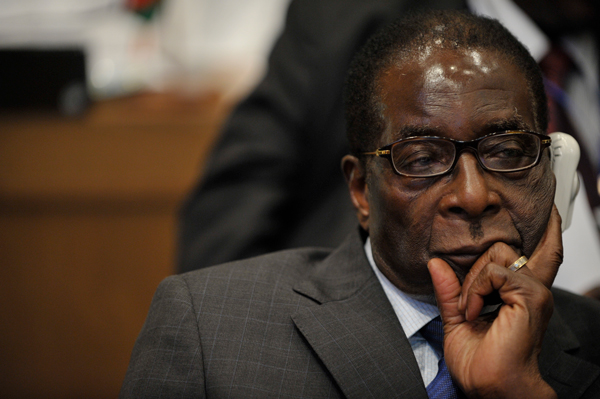
‘What’s happening?’ ‘Have you seen the news?’ ‘Is this it?’- these were the messages that started coming in from contacts all over the world, as I was preparing to head out to the Annual Meeting of the African Studies Association in Chicago last month.
Following the story
I checked my Twitter feed, saw reports of army trucks out of barracks in Harare, and concluded, ‘Nothing much – just the usual thunderstorms within Zanu-PF. No-one is mobilising on the street and it's a lot less exciting than Pastor Evan's trial. It will blow over’. But, as we now know, this time it didn’t blow over.
By the time I’d checked into my hotel room, the military were on national television in Zimbabwe, saying that they had intervened to remove ‘criminal elements’ close to the President and Commander-in-Chief of the Zimbabwean forces, Robert Gabriel Mugabe. And so began the not-a-coup, which led to the not-a-resignation, and finally, to the not-an-impeachment. And now we have the not-a-revolution – although there have been a couple of almighty good parties in between.
By Wednesday, in Chicago, many of the world’s experts on Zimbabwean politics and history were gathering together in one place. We were engrossed in Facebook and Twitter and we didn’t sleep.
On Friday night, we organised a panel, with Zimbabwean commentators Skyped in from London and Harare, and I broadcast it live via the Facebook page of the Journal of Southern African Studies. Thousands of people joined us online to try to make sense of what was going on.
By mid-day on Friday, much of the African Twittersphere was observing ‘Zimbabwe’s coup is much more peaceful than elections. Can't we amend the constitution so that we can have a coup every 5 years instead of elections?’ The army had intervened, they said, solely in order to protect the constitution. And this is what makes Zimbabwe’s one of the most interesting – and significant – coups in African history.
It was a completely legal coup. Every step of the way, the army has worked within the constitution. And no blood has been shed.
Partying in Zimbabwe
On Saturday, Zimbabwe partied. There was no particular justification for a party at that point, but the war veterans association had invited everyone, and it was a Saturday and the sun was shining. In Chicago, we shared photos and videos of the nation partying together on social media until the sun went down, and argued about whether ‘the people’ had any role in this constitutional process at all.
Sunday was the day of the non-resignation. Emergency meetings of the provincial branches of Zanu-PF all weekend had produced the required number of motions within the party’s constitution for the leader to be deposed from the party. It didn’t mean he wasn’t President, though – that needed a resignation. I delayed going to the airport, expecting the announcement any moment. The hours passed. Talks continued between army and nonagenarian.
The constitution - stress-tested to its limits
The army had set a deadline of noon on Monday. If Mugabe didn’t resign by then, the next option was impeachment by Parliament. The army and Zanu-PF didn’t want that option, because it required support from the opposition members of parliament, who wanted to drive some hard bargains. The deadline passed. The opposition sharpened its negotiating knives. The constitution was about to be stress-tested to its limits.
And then, as the sun was beginning to set, it was all over and Harare erupted. All over the world, we watched a national party being broadcast live, for hours and hours. In a county where the vast majority of the population is under 25, most people were experiencing life without Mugabe’s rule for the first time in their lives.
A unique form of coup?
Was it a unique form of coup? Yes, I think it was. As one wag on Facebook asked, ‘Is it unprecedented or unpresidented? I'm confused.’ Is it an opportunity for change? Possibly. But was it also just a storm within factions of Zanu-PF? Yes, I think it was. The people had a couple of great parties, but neither the opposition nor popular protest brought about this change.
At his welcome-home speech at Zanu-PF headquarters, Mnangagwa spoke in English about ‘jobs, jobs, jobs’. But when he switched to speaking in Shona, he started a chant of ‘pasi nemhandu’: down with the enemy. It doesn’t bode well.
Find out more
- Diana Jeater's areas of research
- Studying history at Liverpool